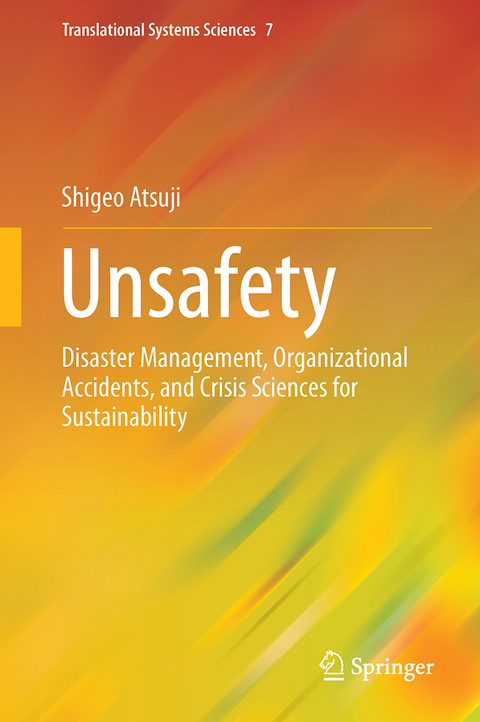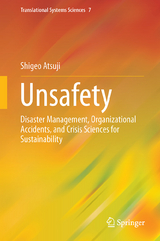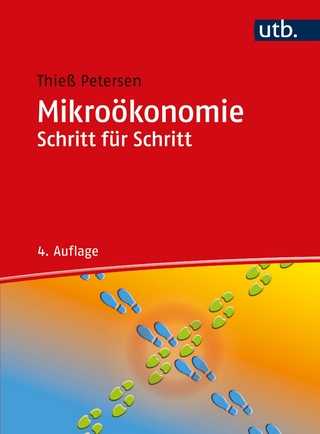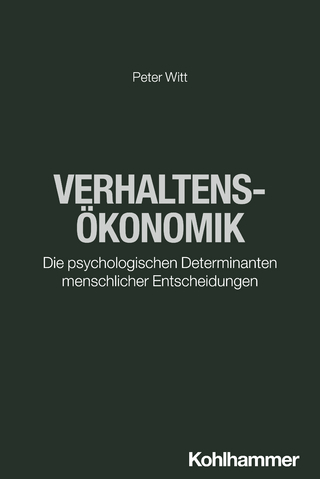Unsafety
Springer Verlag, Japan
978-4-431-55922-1 (ISBN)
In Unsafety, the author focuses on the kinds of unnatural disasters and organizational accidents that arise as repercussions of natural hazards. Japan serves as an example, where earthquakes, tsunamis, and typhoons are common, with the Fukushima nuclear disaster as an outstanding case of this link between natural disasters and organizational accidents. Natural and human-made disasters happen worldwide and cause misery through lossof life; destruction of livelihoods as in agriculture, fisheries, and the manufacturing industry; and interruption of urban life. Unsafety from a disaster in one place increases uncertainty elsewhere, presenting urgent issues in all nations for individuals, organizations, regions, and the state.
The author explains that one factor in the Fukushima catastrophe, which followed in the wake of the earthquake and tsunami in 2011, was the latent deterioration and aging of systems at all levels from the physical to the social, leading through a chain reaction to unsought and unforeseen consequences. Here, the aging of the nuclear reactor system, the breakdown of safety management, and inappropriate instructions from the regulatory authorities combined to create the three-fold disaster, in which technological, organizational, and governmental dysfunction have been diagnosed as reflecting a “systems pathology” infecting all levels.
Dr. Shigeo Atsuji is Professor of Informatics at Kansai University in Japan and a Research Fellow at Kyoto University (2012-13). With a DBA in organization theory and a PhD in policy sciences, he is a member of a number of scholarly associations and societies. Professor Atsuji’s research interests focus on management informatics and organizational intelligence, decision-making theory and the organizational aspects of accident and disaster. He has led teams producing case studies of events such as the Fukushima nuclear power station disaster linked to the earthquake and tsunami that struck Japan in 2011 and the JR West railway accident of 2005 and has presented associated case studies funded by the government at international conferences including those of the International Society for Systems Science and the International Federation of Scholarly Associations of Management.
Preface.- Part I Disaster Chain.- 1 Carbonized Terra: Paradox of Civilization.- 2 The Fukushima Nuclear Catastrophe: Systemic Breakdown and Pathology.- 3 Our Stolen Sustainability: Contamination by Environmental Hormones.- Part II Organizational Accidents.- 4 Crime or Punishment: Brakeless Accidents without Compliance and Governance.- 5 Lost Trust: Socio-biological Hazard: from AIDS Pandemic to Viral Outbreaks.- 6 Boiling Globe: Cumulative Thermal Effluent from the World’s 441 Nuclear Reactors over 40 years.- Part III Science of Crises.- 7 Escape from Disaster: Invisible Informatics of Risks and Crises.- 8 Crisis Sciences for Sustainability beyond the Limits of Management and Policy.- 9 Remaking Eco-civilization by Sustainable Decision-making.- Bibliography.- Index.
| Erscheinungsdatum | 09.07.2016 |
|---|---|
| Reihe/Serie | Translational Systems Sciences ; 7 |
| Zusatzinfo | 44 Illustrations, color; 50 Illustrations, black and white; XXIII, 232 p. 94 illus., 44 illus. in color. |
| Verlagsort | Tokyo |
| Sprache | englisch |
| Maße | 155 x 235 mm |
| Themenwelt | Sozialwissenschaften ► Soziologie |
| Wirtschaft ► Allgemeines / Lexika | |
| Wirtschaft ► Betriebswirtschaft / Management | |
| Wirtschaft ► Volkswirtschaftslehre ► Mikroökonomie | |
| Schlagworte | Decision-Making • disaster management • Eco-civilization • Organizational Accident • Resilience for Sustainability |
| ISBN-10 | 4-431-55922-1 / 4431559221 |
| ISBN-13 | 978-4-431-55922-1 / 9784431559221 |
| Zustand | Neuware |
| Haben Sie eine Frage zum Produkt? |
aus dem Bereich




